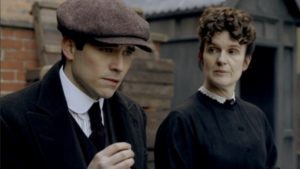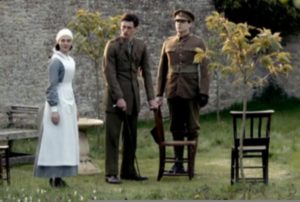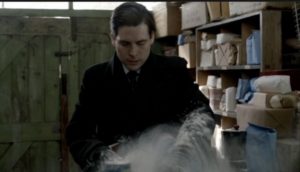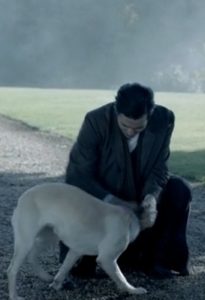DOWNTON ABBEY: WHAT IS GOING ON WITH THOMAS BARROW? (SEASONS 1 & 2)
I was recently lured into watching Downton Abbey. I didn’t intend to view the entire series, but after checking out a bit of season two, I decided to cue episode one, season one— to begin from the beginning. It didn’t take long to notice that one character, first footman and resident villain Thomas Barrow, experiences a continuous string of bad luck.
So far we have seen Thomas launch three—and possibly four— unsuccessful attempts at landing a valet job.
Every twisted plot he hatches blows up in his face; his defeats are simply spectacular. At first I thought it funny. Who wouldn’t? Thomas, after all, has a sharp, cruel tongue. He is a liar, a thief, a manipulator, and could use good slap or two. But as the series progressed, I noticed a common theme surrounding his failings: a desire to better one’s position. Standing in this light, Thomas suddenly becomes a little more interesting. Why, I wondered, must desire for upward mobility fuel his excessive actions which lead to misery? Why can’t his continuous misfortune be born of greed or of schadenfreude instead? For what is this character unremittingly punished? What is going on with Thomas Barrow?
Let’s take a look at the way in which he is first presented:
- Thomas is introduced as first footman and temporary valet to the head of the household, Robert Crawley, Earl of Grantham.
- He is astonishingly rude and condescending to William, the second footman.
- He is jealous of the affection William receives from fellow servants.
- Though he is rather young and there are other young adults in the house, his only confidante is the bitter, middle-aged lady’s maid, Miss Sarah O’Brien.
- Thomas does not resent his position as footman, rather, he desperately wishes to be promoted to official valet. Miss O’Brien, on the other hand, resents her position as lady’s maid, yet never states a desired alternative. What, aside from surface bitterness, have they in common?

Barrow and O’Brien
As the story progresses, we witness Thomas’s string of failures and mishaps:
- Thomas does not get the valet position. It goes to a newcomer, Mr. Bates.
- Thomas’s many attempts to cause Mr. Bates’ termination are unsuccessful.
- Thomas’s attempt to secure a valet position with an old lover, the Duke of Crowborough, is unsuccessful and humiliating:
- He had planned to use their previous relationship as basis for landing the new job but was rejected, with Crowborough mocking their time together as a silly, youthful dalliance.
- Thomas’s follow-up extortion attempt is unsuccessful:
Thomas tries to blackmail the duke with the threat of exposing their relationship, using old love letters as proof. This is very dangerous territory, as: 1. Homosexuality was illegal in England (and elsewhere) at that time and 2. The relationship crossed class boundaries. But of course: - Unbeknownst to Thomas, the letters have been stolen and are actually in the duke’s possession. Crowborough whips them out, tosses them into the fireplace, and goes on verbally humiliate Thomas. It is embarrassing and difficult to watch.
- Thomas’s follow-up extortion attempt is unsuccessful:
- Thomas then tries—via an honest application through the head butler, Mr. Carson— to secure a valet position with the new Downton heir, Matthew Crawley. Thomas is rejected. Again. This time in favor of Mosely.
- He had planned to use their previous relationship as basis for landing the new job but was rejected, with Crowborough mocking their time together as a silly, youthful dalliance.
- He later tries to seduce a house guest, Turkish diplomat Kemal Pamuk, and is rejected. I am not sure but based on the short conversation, it is implied that Thomas was once again looking to secure a valet position.
- Additionally, it looked as if Pamuk knew that which Thomas had been proposing and purposely led him on so that he could use the seduction attempt as blackmail. The irony.
So far we have seen Thomas launch three—and possibly four— unsuccessful attempts at landing a valet job. We are still in season one but by its end, we learn a little bit more about Thomas’s ideas and his ever spinning mind as we witness the hatching of his single scheme that does not involve career advancement:
This could have been Thomas’s chance. His chance for redemption. He got his promotion. He has seen the atrocities of war. He has seen men die.
Thomas anticipates the impending war, understands that he most certainly will be drafted, and is desperate to avoid battle. So he preempts the draft by volunteering to become a medic. With this position, he believes, he will be spared armed conflict and potential death. But of course this fails as well, as he is indeed sent to the front lines. As season two opens, we see Thomas in one of his darkest moments. War has proven to be too much for him. Always the plotter, he purposely sustains a hand wound, so that he can be discharged. It is interesting to note that so far, this is the only plan of his that actually works. Meanwhile, O’Brien and Lady Grantham passively arrange to have Thomas moved to Downton’s local military hospital.

Shortly thereafter, Downton Abbey is transformed into a military convalescent home. And due to more of O’Brien’s meddling, Thomas is promoted to acting sergeant, transferred to Downton Abbey, and placed in charge of its day-to-day operations. That’s right. Thomas is now supervising his former co-workers.
This could have been Thomas’s chance. His chance for redemption. He got his promotion. He has seen the atrocities of war. He has seen men die. We know that vulnerability lies beneath his rough exterior and that he has a possible soft spot for the ill. While working at the hospital, Thomas was very helpful did not attend to the wounded begrudgingly. He did what he was told. We saw that he is capable of emotion and that he battles his own inner fears. He provided much needed solace for a blind solider, Lieutenant Courtenay, and in him found a friend with whom he could empathize and identify.
He expressed his sense of isolation, offered sound advice regarding self-preservation and the rejection of a defeatist attitude, defended him to Dr. Crawley—was correct in his assessment of the Lieutenant’s condition—and sobbed, yes sobbed when Courtenay killed himself. Thomas could have returned to Downton a changed man. Not as a goody-two-shoes, for that would be painfully boring, but as someone with a little sense. But my goodness. Upon his return, Thomas was meaner and even more condescending than before. And more irritatingly, he continues to flounder while reaching for the same kinds of goals.
So eventually the war ends and what is Thomas now? Out of a job.
His distress continues.

Thomas discovers that he’s been scammed
Scammed!
The head cook, Miss Patmore, mentions the scarcity of food and Thomas decides to go into the illegal food rationing business. He invests all of his earned money, and borrowed money as well, but plans to deal in the shady endeavour only as long as it takes to set up shop honestly. Two weeks, by his estimation. He delivers to Patmore and will not receive payment unless food prepared with his goods passes Patmore’s taste test. That is the agreement.
Of course he fails.
He has been sold garbage, not groceries. Plaster stuffed into flour bags and such. Now he has no business, no money, and no place of residence.
In one of the most pitiful scenes, he grovels to the head butler, Carson, begging to be allowed to live at Downton. “I’ll make myself useful,” he says. Carson essentially tells Thomas to get lost. It is depressing. Just pitiful. Rob James-Collier really puts on the sad face here.
But luckily for Thomas, swine flu hits Downton just as the family plans for Matthew’s wedding. Guests are arriving. Family members fall ill. The house is down several servants. Mosely falls ill. Carson falls ill. Thomas’s position hasn’t yet been filled. Neither has William’s. (He’s dead.) And the world will stop spinning if woman serves in the dining room. Thomas sweeps into action, dusts off his old livery, proves himself irreplaceable, and thus reclaims his old job. It was funny to watch:
Housekeeper:
But I have nothing to pay you—
Thomas:
Call it rent.
Once again, Thomas is first footman and pining to become valet. But Crawley does not trust him. Acting on advice from Obrien, and with hopes of inciting Crawley’s fear and worry, Thomas abducts Isis, Crawley’s beloved dog, and locks her in a shed. He plans to later “find” and “return” the dog, thus earing Crawley’s everlasting gratitude. The dog is left in the shed overnight.

This time, he does not fail, at least not entirely. Early morning, Thomas returns to the shed and finds it empty. Disheveled, dirty, and sick with worry himself, he frantically searches for Isis. While doing so, he runs into Crawley, who happens to be out on a morning stroll.
Crawley explains to Thomas that a child had previously returned the dog, but is impressed that Thomas would awaken so early and invest so much effort into the search. He believes this act is indicative of Thomas’s dedication, feels that Thomas should be given a second chance, and offers him a job as temporary valet.
Thus ends season two.
We are back to square one with first footman Thomas Barrow acting as temporary valet to Robert Crawley, Earl of Grantham.
We have witnessed Thomas’s many failures, the common theme being his desire to improve his position. I am not sure if his latest quest for upward mobility will lead to misery, as have the others. I do know that with the dog-napping, his character does not seem to have grown very much.
So I’m hoping that season three will provide a bit of redemption, a chance for us to see growth, to see Thomas succeed in an honest fashion. Because without growth, without acquisition of new character traits, he has no choice but to use what he has to get what he wants. And his goals are admirable. He wants what everyone else wants: to get ahead.
Hopefully, season three will round him out. Because at this point, his stunted development combined with his scheming to get a better position and subsequent suffering has become repetitious. A simple look at the situation may imply that Thomas’s reward for ambition is misery.
But I don’t think this is the case. I think the Thomas character has potential that has not yet been fully realized. He is a survivor. He is perceptive. He is not afraid to take chances. He is good at his job. He most definitely goes the extra mile, a trait which of course can be applied positively or negatively. And with a character like Thomas, this can be very interesting indeed.
On the other hand, Thomas certainly deserves to pay for his misdeeds. Consider, for example, his framing of the innocent, unwarranted verbal attacks, theft, lying, and cruelty to animals.
So if in season three he must continue to suffer, I hope a malevolent or negative quality, such as envy, acrimony, or spite, serves as the catalyst for his misfortunes. Or that his motivations are diversified, so that his desire to improve his station in life is not the primary incentive which fuels his hapless and ill-fated schemes.
Or, if career and social advancement must remain his sole motivation, I’m hoping that we see him attain a slew of positive, amiable character traits and yet flatly refuse to use them, instead opting to rely on familiar and/or negative characteristics to obtain his goal. That would be interesting.
Because, well, what drives this character? Will he find a bit of lasting success? Will history repeat itself? And with either scenario, why? So many questions. So many possibilities. But I am incredibly curious. Season three begins in less than a week; five more days to go….
